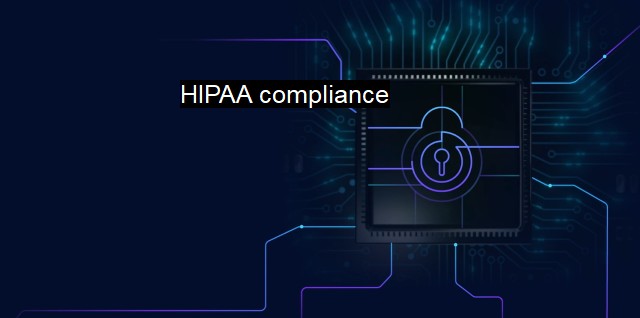What is HIPAA compliance?
Importance of HIPAA Compliance for Cybersecurity and Antivirus: Safeguarding Patient Information against Cyberattacks and Data Breaches
HIPAA, or the Health Insurance Portability and Accountability Act of 1996, is legislation that provides data privacy and security provisions for safeguarding medical information. This legislation has had a broad-reaching effect on healthcare, insurance, and IT security and fundamentally transforms the approach of these industries towards data security. With HIPAA compliance is critical as it is a direct measure of responsibility and effectiveness in keeping protected health information (PHI) secure and confidential.HIPAA compliance is a clearly-defined set of standards and regulations that govern the way health and personal information is managed, processed, stored, and disseminated. There are two core aspects to HIPAA, known as the Privacy Rule and the Security Rule. The Privacy Rule outlines national standards to protect individuals' medical records and other personal health information, while the Security Rule establishes a national set of security standards for protecting health information that is held or transferred electronically.
These regulations include Safeguard measures which are broken down into both Physical Safeguards and Technical Safeguards. The Physical Safeguards mostly concern the physical access to the data storage area, including workstations and electronic devices. On the other hand, Technical Safeguards directly involve cybersecurity and antivirus measures. Technical Safeguards include such things as unique User Identification, Automatic Logout, Encryption and Decryption and procedures for verifying the access to ePHI (Electronic Protected Health Information) is authorized.
Implementing HIPAA-compliant cybersecurity measures is a multi-step process. It begins with conducting a comprehensive risk analysis to identify all systems and applications that contain or handle PHI, defining how data is protected whilst in transit, during storage, and throughout the disposal process.
Next, institutions must ensure that data integrity controls are in place which is achieved through measures such as checksum verification and digital signatures. To maintain confidentiality and protect against unauthorized disclosures, encryption protocols must be implemented, regularly reviewed, and updated to stay abreast with current industry standards.
Effectively, HIPAA compliance demands that all healthcare covered entities and businesses treat data privacy as a priority, implementing highly robust cybersecurity defenses which can withstand disruptive threats. The proactive nature of a continuous HIPAA compliance regimen ensures that security is consistently updated with the latest patches and invulnerability measures.
Significantly, HIPAA-compliant antivirus software provides an additional layer of security, protecting an organization’s network and devices against malware, ransomware, and other threats. These antivirus solutions need to be high-performing tools equipped with real-time scanning, instant threat signaling, and swift response mechanisms. The software should also have the capability to rectify violations instantly or alert the necessary personnel to resolve the incident immediately.
It should be noted that HIPAA compliance is not a one-time event but an ongoing process. Compliant measures must continuously evolve with progressing technology and shifting cybersecurity threats. Compliant organizations must conform to regular audits of their technical, physical, and administrative protocols to remain up-to-date with new regulations.
HIPAA compliance in the context of cybersecurity and antivirus is the adherence to a comprehensive set of rules and standards designed to protect sensitive healthcare data from threats and vulnerabilities. It's the standard by which all healthcare organizations, health plans, and health IT companies are held to ensure the safekeeping of our most critical personal information. Non-compliance not only presents operational and business continuity risks but may also lead to significant legal and financial repercussions. Constant surveillance, up-to-date technology, and strict enforcement of these regulations are key for successful HIPAA compliance. Cybersecurity and antivirus systems are integral components of that compliance, forming essential lines of defense against a wide range of potential threats to the security and integrity of healthcare information.

HIPAA compliance FAQs
What is HIPAA compliance in cybersecurity?
HIPAA compliance in cybersecurity is the adherence to the security and privacy requirements outlined in the Health Insurance Portability and Accountability Act (HIPAA) to safeguard protected health information (PHI) against cybersecurity threats.Who needs to be HIPAA compliant in the cybersecurity industry?
Any healthcare organization or business associate that handles, processes, stores or transmits PHI is required to be HIPAA compliant in the cybersecurity industry. This includes covered entities such as hospitals, doctors, health insurance companies and business associates such as data centers and cloud service providers.What are the consequences of not being HIPAA compliant in cybersecurity?
The consequences of not being HIPAA compliant in cybersecurity can be severe and may include hefty fines, legal action, and damage to reputation. HIPAA violations can result in fines ranging from $100 to $50,000 per violation, or up to $1.5 million per year for willful or negligent violations.What are some best practices for maintaining HIPAA compliance in cybersecurity?
Some best practices for maintaining HIPAA compliance in cybersecurity include conducting regular risk assessments to identify potential security vulnerabilities, implementing strong access controls to protect PHI, encrypting data in transit and at rest, training employees on proper security protocols, and regularly monitoring and auditing systems for unauthorized access or breaches.| | A | | | B | | | C | | | D | | | E | | | F | | | G | | | H | | | I | | | J | | | K | | | L | | | M | |
| | N | | | O | | | P | | | Q | | | R | | | S | | | T | | | U | | | V | | | W | | | X | | | Y | | | Z | |
| | 1 | | | 2 | | | 3 | | | 4 | | | 7 | | | 8 | | |||||||